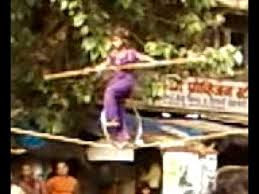Touch the underside of a penny you find on the street
Doesn't feel any different unless you close your eyes ― Dave Matthes
Doesn't feel any different unless you close your eyes ― Dave Matthes
The
newspaper had a last corner reserved for an article on the Dombaris. The
producer of the film expressed about his oncoming film that tackled the lives of gypsies in India dialectally . .
A few
months back there lived a family of gypsies for a short period. In the mornings I
could see them open their possessions that had been carefully
packed the previous night, and getting them ready to show human stunts that
vaguely resembled the monkey tricks, their daughter, little Neela was no less
than a monkey in her antics and gusto. Neela was a seven year old girl who wore
frocks when she wasn’t presenting her
tricks. Her skin was brown, sun tanned with ill kept brown hair that was combed
laboriously by her mother as she was the heroine of every act. Her brown eyes
searched for her little brother who followed her everywhere with a toothless
smile. Neela was lean and nimble and would run behind her baby brother Shiva as
he crawled away to new unknown places. She feared that the vehicles would run over
her little brother. Her constant care kept the family free to collect money and
cook for themselves in the evenings. One morning as I was leaving early I saw Neela
standing near a tea cart. The man pumped
and started the stove after burning the wick of the pumping stove. He had a
huge saucepan in which he brewed milk and water with crushed ginger, spices and tea leaves. He
spoke to Neela lovingly as he kept checking the tea by pulling out ladles full of the mixture and dropping it back. He sieved it quickly
and gave little Neela her cup of hot tea that brought del
Whenever she heard the loud noise of the kettledrum , she understood that she needed to hurry back. She
would leave her little brother Shiva near her mother and begin rocking the handdrum or a Dumaru rhythmically, in loud and soft drops of sound. In the stillness of
the morning the tiny drum made deafening noise attracting people’s attention.
As the crowd would begin gath Neela’s mother played the
drums and Neela performed in a beautiful purple frock and leggings. That day
was no different, Neela began running efficiently to gain swiftness and perform
a few acrobatics. People clapped as she performed the hoopla and somersaults,
but what attracted one was the lovely smile that she sported and the immense confidence
she displayed. I then saw her climb up the rope. As she walked, she swayed the
rope intermittently showing her expertise. Suddenly we heard a loud, angry cry
from her mother, she yelled at Neela in anger. We could see her beautiful
movements waver as the drum beats slowed. I looked at the frightened face, but
Neela managed to cover her feelings. She jumped down with the air of a true
acrobat and danced towards little Shiva, the drum beats continued. Shiva
had fallen down and was crying in pain and anguish, however, he felt the sweep
of a loving hand pick him dancing, moving back. She lovingly handed the baby to
her mother and now jumped on the rope once more. She somersaulted and displayed
slips, climbs and many more frolics visibly well.
At the end she snatched little Shiva from her mother’s arms and went around with a bowl to collect money. People heaved rupees and coins in her bowl. Her eyes gleamed with joy as her brother pulled her head near his face. Perhaps the onlookers were moved by the silent adoration of the little one for her brother. A sister’s love is equivalent to gold. She is next to the parent yet closer than a parent. Sibling love knows no boundaries of riches or poverty. It was this invisible act that left a memoir in the hearts of the onlookers.
At the end she snatched little Shiva from her mother’s arms and went around with a bowl to collect money. People heaved rupees and coins in her bowl. Her eyes gleamed with joy as her brother pulled her head near his face. Perhaps the onlookers were moved by the silent adoration of the little one for her brother. A sister’s love is equivalent to gold. She is next to the parent yet closer than a parent. Sibling love knows no boundaries of riches or poverty. It was this invisible act that left a memoir in the hearts of the onlookers.
In photographs of us together,
she
and
―Jandy Nelson
―




Comments
Post a Comment